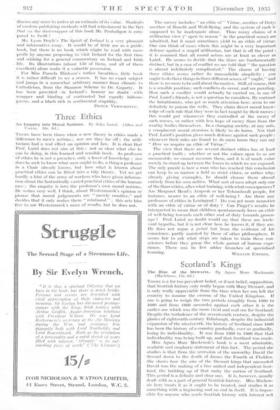Three Ethics
.Tticau have been times when a new theory in ethics made 'a
• difference to men's actions ; nor are they far off ; the utili- tarians had a real effect on opinion and law. It is clear that Prof. Laird does not aim at this ; not so clear what else he can be doing, in this learned and sensible book. As professor .Of ethics he is not a preacher, only a lover of knowledge ; nor -,does he seek to know what men ought to do, a thing a professor in a Chair already knows, but how what is known abdut practical ethics can be fitted into a tidy theory. Yet we get hardly a hint of the army of workers who have given informa7 t ion about the fantastically varied practical ethics of the human , race ; the enquiry is into the professor's own moral notions. He writes very well, I think, about Westermarck's opinion or phrase that moral judgements are " merely emotive," and decides that it only makes them " relational " ; this sets him free to use Westermarck's mass of results, but he does not, The survey includes " an ethic of " Virtue, another of Duty, another. of Benefit and Well-Being, and the system of each is supposed to be 'inadequate alone. Thus many claims of a utilitarian view (" open to reason " in the practical sense) arc admitted,. but it must sometimes yield to an ethic of virtue. One can think of cases where this might be a very important defence against a stupid utilitarian, but that is off the point ; it is assumed that all moral actors are at least as clever as Laird. He seems to decide that the three arc fundamentally distinct, but in, a case of conflict we are told that " the question is almost indefinitely complicated." The charm of having three ethics seems rather its unassailable simplicity ; you ought to do three things in three different senses of "ought," and there is no more to be said about the matter. Still, of course, this is a sensible position ; such conflicts do occur, and are puzzling. How such a conflict would actually be carried on, in one of Prof. Laird's friends, is not a question he considers. By contrast the intuitionists, who get so much attention here, seem to me definitely to poison the wells. They claim direct moral know- ledge of each rule that they were in fact taught by their nurses ; this would put whomever they controlled at the mercy of such nurses, or rather with less hope of mercy than from the worthy bodies themselves. In a changing society, at any rate, a complacent moral atomism is likely to do harm, Not that Prof. Laird's position gives much defence against such people ; whenever their rules are found to do Mere harm they can say " Here we require an ethic of Virtue."
The view that there arc several distinct ethics has at least a practical truth ; whether or not the values open to us arc measurable, we cannot measure them, and it is of much value merely to stand up between the forces to which we arc exposed. The only puzzle is how a man who has reached this conclusion can keep to so narrow a field as strict ethics, or rather why, already giving examples, he should choose them almost eat irely from his own milieu. What sort of men adopt only one of he we ethics, after what training, with what consequences? Are Margaret Mead's Arapesh or her Tchainbouli people, for instance, nearer to an ethic of well-being ? Are there any professors of ethics in Leningrad ? Do you get more neurotics with an ethic of virtue or of duty ? Can Piaget's results be interpreted to mean that children spontaneously have an ethic of well-being towards each other and of duty towards grown- ups ? Prof. Laird no doubt would say that these are irrele- vant bypaths, but it is not clear how he knows it., if they arc. He does not argue a priori but from the evidence of his conscience, partly assisted by those of other philosophers. It seems fair to ask what steps are taken to train these con- sciences before they grasp the whole gamut of human expe- rience. There can be few odder branches of specialised












































 Previous page
Previous page